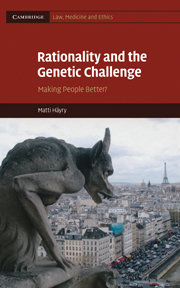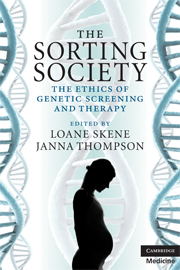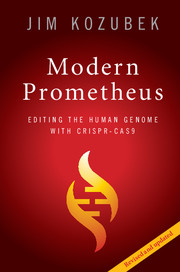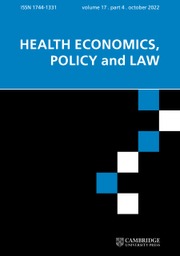Rationality and the Genetic Challenge
Making People Better?
$49.99 ( ) USD
Part of Cambridge Law, Medicine and Ethics
- Author: Matti Häyry, University of Manchester
- Date Published: April 2010
- availability: This ISBN is for an eBook version which is distributed on our behalf by a third party.
- format: Adobe eBook Reader
- isbn: 9780511717581
Find out more about Cambridge eBooks
$
49.99 USD
( )
Adobe eBook Reader
Other available formats:
Paperback, Hardback
Looking for an examination copy?
If you are interested in the title for your course we can consider offering an examination copy. To register your interest please contact [email protected] providing details of the course you are teaching.
-
Should we make people healthier, smarter, and longer-lived if genetic and medical advances enable us to do so? Matti Häyry asks this question in the context of genetic testing and selection, cloning and stem cell research, gene therapies and enhancements. The ethical questions explored include parental responsibility, the use of people as means, the role of hope and fear in risk assessment, and the dignity and meaning of life. Taking as a starting point the arguments presented by Jonathan Glover, John Harris, Ronald M. Green, Jürgen Habermas, Michael J. Sandel, and Leon R. Kass, who defend a particular normative view as the only rational or moral answer, Matti Häyry argues that many coherent rationalities and moralities exist in the field, and that to claim otherwise is mistaken.
Read more- Separate introductions for genetic practices and philosophical considerations help the reader keep the different dimensions analytically separated
- Introduces only one main ethical consideration with the introduction of a new scientific or medical practice, allowing the reader to gain a thorough picture of the practice and of the nuances of the ethical argument
- Each chapter begins with a one-sentence summary of its contents, giving the reader an orientation to the text ahead
- Summaries bring all the ethical considerations together, helping the reader see what has been claimed in the book and how these claims have been supported
Reviews & endorsements
"This book thoughtfully presents work by major authors along the entire ideological spectrum....The coherent analysis and fair presentation of each thinker's case for and against genetic procedures, testing, and research show how notions of God, community, agency, and the self lead thinkers to different positions on genetic procedures....This important guide to work on genetics and ethics would be a helpful addition to collections in both bioethics and philosophy."
--ChoiceCustomer reviews
Not yet reviewed
Be the first to review
Review was not posted due to profanity
×Product details
- Date Published: April 2010
- format: Adobe eBook Reader
- isbn: 9780511717581
- availability: This ISBN is for an eBook version which is distributed on our behalf by a third party.
Table of Contents
1. Seven ways of making people better
2. Rational approaches to the genetic challenge
3. The best babies and parental responsibility
4. Deaf embryos, morality, and the law
5. Saviour siblings and treating people as a means
6. Reproductive cloning and designing human beings
7. Embryonic stem cells, vulnerability, and sanctity
8. Gene therapies, hopes, and fears
9. Considerable life extension and the meaning of life
10. Taking the genetic challenge rationally.
Sorry, this resource is locked
Please register or sign in to request access. If you are having problems accessing these resources please email [email protected]
Register Sign in» Proceed
You are now leaving the Cambridge University Press website. Your eBook purchase and download will be completed by our partner www.ebooks.com. Please see the permission section of the www.ebooks.com catalogue page for details of the print & copy limits on our eBooks.
Continue ×Are you sure you want to delete your account?
This cannot be undone.
Thank you for your feedback which will help us improve our service.
If you requested a response, we will make sure to get back to you shortly.
×






